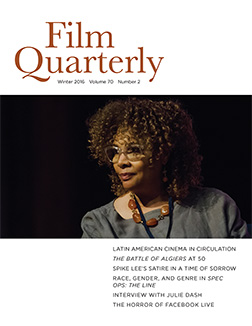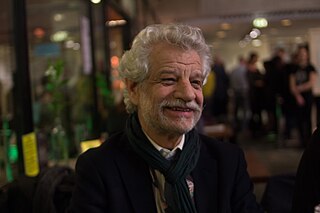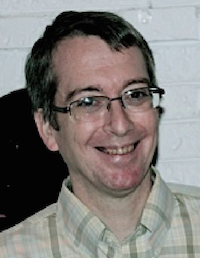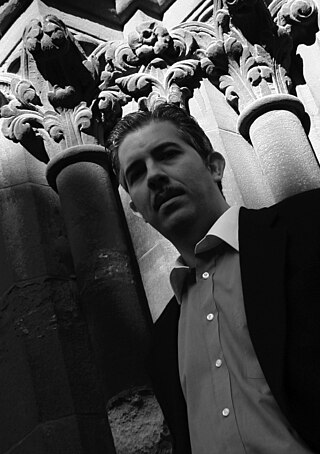
André Bazin was a renowned and influential French film critic and film theorist.

The British Film Institute (BFI) is a film and television charitable organisation which promotes and preserves film-making and television in the United Kingdom. The BFI uses funds provided by the National Lottery to encourage film production, distribution, and education. It is sponsored by the Department for Digital, Culture, Media and Sport, and partially funded under the British Film Institute Act 1949.
Sight and Sound is a British monthly film magazine published by the British Film Institute (BFI). It conducts the well-known, once-a-decade Sight and Sound Poll of the Greatest Films of All Time, ongoing since 1952.

Who's Who is a reference work. It has been published annually as a book since 1849. It is also published online and has been published on CD-ROM. It lists, and gives information on, people from around the world who influence British life. Entries include notable figures from government, politics, academia, business, sport and the arts. Who's Who 2023 is the 175th edition and includes more than 33,000 people.
Robert James Leslie Halliwell was a British film critic, encyclopaedist and television rights buyer for ITV, the British commercial network, and Channel 4. He is best known for his reference guides, Filmgoer's Companion (1965), a single volume film-related encyclopaedia featuring biographies and technical terms, and the eponymous Halliwell's Film Guide (1977), which is dedicated to individual films. For some years, his books were the most accessible source for movie information, and his name became synonymous with film knowledge and research. Anthony Quinton wrote in the Times Literary Supplement in 1977:
Immersed in the enjoyment of these fine books, one should look up for a moment to admire the quite astonishing combination of industry and authority in one man which has brought them into existence.
Raymond Durgnat was a British film critic, who was born in London to Swiss parents. During his life he wrote for virtually every major English language film publication. In 1965 he published the first major critical essay on Michael Powell, who had hitherto been "fashionably dismissed by critics as a 'technician’s director'", as Durgnat put it.
Television studies is an academic discipline that deals with critical approaches to television. Usually, it is distinguished from mass communication research, which tends to approach the topic from a social sciences perspective. Defining the field is problematic; some institutions and syllabuses do not distinguish it from media studies or classify it as a subfield of popular culture studies.

Denis Gifford was a British writer, broadcaster, journalist, comic artist and historian of film, comics, television and radio. In his lengthy career, he wrote and drew for British comics; wrote more than fifty books on the creators, performers, characters and history of popular media; devised, compiled and contributed to popular programmes for radio and television; and directed several short films. Gifford was also a major comics collector, owning what was perhaps the largest collection of British comics in the world.

Film Quarterly, a journal devoted to the study of film, television, and visual media, is published by University of California Press. It publishes scholarly analyses of international and Hollywood cinema as well as independent film, including documentary and animation. The journal also revisits film classics; examines television and digital and online media; reports from international film festivals; reviews recent academic publications; and on occasion addresses installations, video games and emergent technologies. It welcomes established scholars as well as emergent voices that bring new perspectives to bear on visual representation as rooted in issues of diversity, race, lived experience, gender, sexuality, and transnational histories. Film Quarterly brings timely critical and intersectional approaches to criticism and analyses of visual culture.
Peter Wollen was a film theorist and filmmaker. He studied English at Christ Church, Oxford. Both political journalist and film theorist, Wollen's Signs and Meaning in the Cinema (1969) helped to transform the discipline of film studies by incorporating the methodology of structuralism and semiotics. He taught film at a number of universities and was Professor Emeritus at the University of California, Los Angeles at the time of his retirement from academe in 2005.
Sheldon Hall is a film historian based in the Humanities department of Sheffield Hallam University.

The University of Hawaiʻi Press is a university press that is part of the University of Hawaiʻi.
Dina Iordanova is an educationalist and Professor of Film Studies at the University of St. Andrews. A specialist in world cinema, her special expertise is in the cinema of the Balkans, Eastern Europe, and Europe in general. Her research approaches cinema on a meta-national level and focuses on the dynamics of transnational film; she has special interest in issues related to cinema at the periphery and in alternative historiography. She has published extensively on international and transnational film art and film industry, and convenes research networks on film festivals and on the Dynamics of World Cinema, with funding from the Leverhulme Trust.

Pam Cook is Professor Emerita in Film at the University of Southampton. She was educated at Sir William Perkins's School, Chertsey, Surrey and Birmingham University, where she was taught by Stuart Hall, Richard Hoggart, Malcolm Bradbury, and David Lodge. Along with Laura Mulvey and Claire Johnston, she was a pioneer of 1970s Anglo-American feminist film theory. Her collaboration with Claire Johnston on the work of Hollywood film director Dorothy Arzner provoked debate among feminist film scholars over the following decades.
Toby Miller is a British/Australian-American cultural studies and media studies scholar. He is the author of several books and articles. He was chair of the Department of Media & Cultural Studies at the University of California, Riverside (UCR) and is most recently a professor at Loughborough University. Prior to his academic career, Miller worked in broadcasting, banking, and civil service.

Thomas Elsaesser was a German film historian and professor of Film and Television Studies at the University of Amsterdam. He was also the writer and director of The Sun Island, a documentary essay film about his grandfather, the architect Martin Elsaesser. He was married to scholar Silvia Vega-Llona.
Ginette Vincendeau is a French-born British-based academic who is a professor of film studies at King's College London.

Robert Garner is a British political scientist, political theorist, and intellectual historian. He is a Professor Emeritus in the politics department at the University of Leicester, where he has worked for much of his career. Before working at Leicester, he worked at the University of Exeter and the University of Buckingham, and studied at the University of Manchester and the University of Salford.

Timothy Shary is an American film scholar, and a leading authority on the representation of youth in movies. He has been a professor at the University of Massachusetts, Clark University, and the University of Oklahoma. He is now a professor at Eastern Florida State College.

Gary Don Rhodes, Ph.D., is an American writer, filmmaker, and film historian. His work includes research on early 20th century films and key figures such as filmmakers and actors involved in the process. He is best known for his contribution to classic horror films and his multiple biographies on Bela Lugosi. Gary has also contributed to the filmmaking process with both documentaries and mockumentaries. He is also a tenured faculty member in film studies at Queen's University Belfast.










